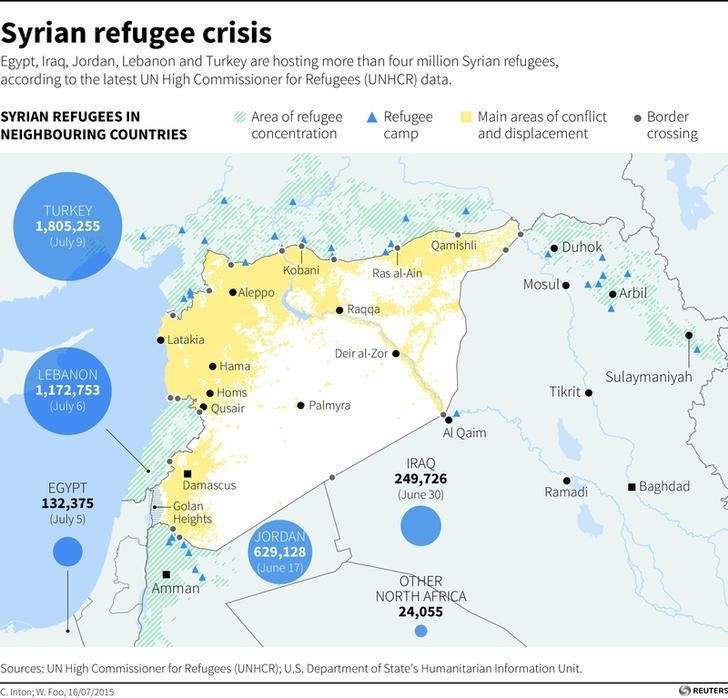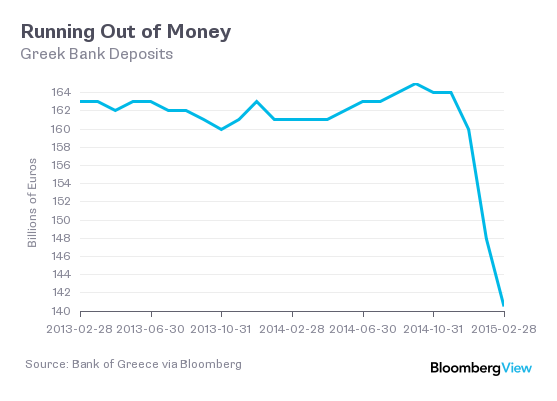What’s next for Europe?

From Grexit to the refugee crisis ... what's waiting for Europe down the line?
Image: REUTERS/Ognen Teofilovski.
Stay up to date:
Migration
Follow the debate live: The Future of Europe will be streaming live from Davos at 10.15 on 21 January 2016.
This will be a critical year for Europe as the region faces a host of complex political and economic challenges. After last year’s rollercoaster ride of crises, many of which still loom large on the continent, the European Union will need to get a handle on its problems, and quickly.
Divided on the inside and with a crisis at its borders as it tries to control the influx of refugees and to prevent terrorist attacks, this will be no easy task. How the EU can protect itself without betraying its values?
Here are five of the region's biggest challenges:
Refugees
More than 1 million migrants and refugees reached Europe in 2015, many of whom were fleeing conflicts in Syria, Iraq and Afghanistan.

The huge influx – the continent’s biggest wave of mass migration since the aftermath of the Second World War – has caused rifts within the EU. Some countries in the border-free Schengen area have put up fences and reintroduced checks, while Hungary and Slovakia have filed lawsuits at the European Court of Justice over plans to share refugees across EU states.
Fear of another terrorist attack in a European city and the prospect of ISIS strengthening its foothold in Libya have ratcheted up the tension still further.
The pressures driving refugees to Europe are not likely to go away in 2016. In fact, EU governments will have to brace themselves for another spike in migration across the Mediterranean Sea this summer. Meanwhile, the tide of compassion that helped Germany absorb over a million asylum seekers in 2015 may ebb, particularly in the wake of the New Year’s Eve attacks in Cologne.
Pope Francis has said that although migration poses a major challenge to Europe’s values and traditions, he believes countries are capable of welcoming refugees without sacrificing security or culture.

Greece
Europe stepped back from the brink and avoided Grexit last year. But the Greek crisis pitted governments against one another, and the economic and social fallout continues to be felt across the Eurozone. Voters in Portugal and Spain rejected the austerity imposed by their bailouts; and Ireland, the only Eurozone member to have general elections this year, may do the same.
Despite a third bailout package, Greece’s underlying problems remain. The issue of debt relief is unresolved, capital controls are predicted to stay in place until at least the second half of 2016 and the real test will come in implementing the necessary reforms.
The IMF predicts that Greece’s economy will shrink by 1.3% in 2016 and that unemployment will remain high.

Brexit
Britain’s vote on whether to remain in the EU, which has been promised by the end of 2017 but could happen as soon as this summer, will be a major tipping point for Europe.
The United Kingdom strengthens Europe’s influence in matters of trade, foreign policy and defence. Leaving would not only mean political and economic disruption for Britain, but the EU as a whole.
The single market would shrink and European financial markets would be bruised by the loss of London. Populist parties on the far left and right would be strengthened, including Marine Le Pen’s Front National in France, which is holding presidential elections in 2017.
A Brexit could also give encouragement to nationalist movements, such as Spain’s autonomous region of Catalonia, where there is a drive for self-determination.
The rise of extremism
The migration issue is fuelling extremist politics across the EU, with hard-right parties in countries including Austria, Denmark, France, Finland, Sweden, Greece, Italy and Hungary experiencing a surge in support.
Sweden, for example, has taken in more asylum seekers than any other European country relative to the size of its population, and was accepting refugees at a rate of 10,000 a week in 2015. Then, late last year, the country re-imposed border controls and announced tough measures to deter refugees.
Despite the government’s reversal of Sweden’s open-door policy, there is continued support for the anti-immigration Sweden Democrats, which last year became the country’s largest party.
Russia
Russia’s annexation of Crimea and support for separatists in Ukraine has shaken Europe’s confidence in the security of its borders for the first time since the Cold War.
The EU is also paying a high price for economic sanctions against Russia. The measures, imposed following the Crimea occupation, are costing the bloc far more than the United States because Russia is one of Europe’s biggest trading partners. It is estimated they could eventually cost Europe more than $100 billion.
EU leaders are facing a precarious balancing act as they attempt to juggle trade interests with sanctions against Moscow and Vladimir Putin’s mission to prop up Syrian President Bashar al-Assad.
Don't miss any update on this topic
Create a free account and access your personalized content collection with our latest publications and analyses.
License and Republishing
World Economic Forum articles may be republished in accordance with the Creative Commons Attribution-NonCommercial-NoDerivatives 4.0 International Public License, and in accordance with our Terms of Use.
The views expressed in this article are those of the author alone and not the World Economic Forum.
Forum Stories newsletter
Bringing you weekly curated insights and analysis on the global issues that matter.
More on Geographies in DepthSee all
Yusuf Maitama Tuggar
July 10, 2025
Kaiser Kuo
June 24, 2025
Kaiser Kuo
June 19, 2025
Aimée Dushime
April 18, 2025
Samir Saran and Anirban Sarma
April 17, 2025
Nada AlSaeed
April 16, 2025





